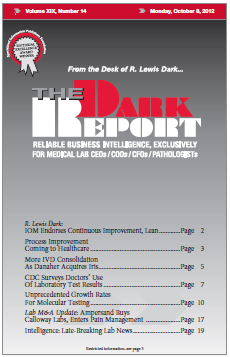CEO SUMMARY: There’s a treasure trove of information and insights about how physicians use clinical laboratory tests contained in survey data recently collected by a team from the Centers for Disease Control and Prevention. Designed to identify challenges in how physicians utilize laboratory tests, the survey findings offer a road map about how innovative clinical …
CDC Surveys Docs’ Use of Laboratory Test Results Read More »
To access this post, you must purchase The Dark Report.


